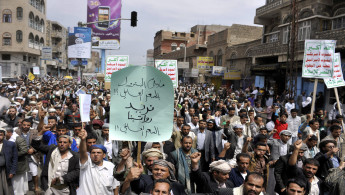Lifting subsidies will do little to cure Yemen’s ills
The decision by the Yemeni government to lift fuel subsidies amid a crippling economic crisis has been met with anger on the streets and criticism from economists who warn that the measure will provide little benefit as long as underlying problems remain unaddressed.
Fuel prices shot up in the wake of the 30 July decision, with diesel prices alone increasing by 150 percent overnight. And in the Arab world’s poorest country, where the United Nations estimates that 10.5 million of a total population of 25 million are food insecure, it did not go down well.
Yemenis took to the streets to protest, erecting road blocks and burning tyres. Economists maintain the “austerity” measure only hurts the poor, with little overall benefit for the country – likely instead to aggravate a situation in which poverty and unrest has stymied the country’s economy for years, said economist Ali al-Wafi.
“The government has failed to deal with the economic issues, or deal with them in any rational manner,” al-Wafi said.
| “Yemen's primary problem is the corruption that is endemic in all government institutions” - Taha al-Faseela |
In defence, the government cites World Bank figures that suggest the lifting of fuel subsidies could save the country $10 million a day. And the overall economic situation would seem to call for drastic measures.
Already, the country is running a budget deficit of an astounding $5 billion for 2014. Public debt is increasing as Yemen’s central bank foreign policy reserves are being depleted. Moreover, the country’s main source of income, the oil sector, has suffered due to tribal unrest.
Tribal attacks on pipelines have grown more frequent since the ousting of former president Ali Abdullah Saleh in 2011, with tribes demanding anything from the release of fellow clan members in custody to simple pay-offs.
Dropping oil revenues
The government earlier this year announced it had lost 3.3 million barrels of oil in the first quarter of 2014 alone because of pipeline attacks. This caused oil earnings to drop to $44.17 million at the end of March, an 80 percent fall compared with the same period in 2013. As a result, Yemen had to import $975 million worth of fuel in the first four months of 2014.
According to the Ministry of Electricity, Yemen also loses at least $300 million a year as a result of attacks on electricity infrastructure. There were 30 such attacks between the start of the year and May, each causing regular power blackouts in Yemen's major cities.
With 60 percent of Yemen's rural areas not connected to the national grid, the total electricity capacity not reaching 1,000 megawatts, and frequent outages in main population centres, Yemenis even dubbed the former electricity minister Saleh Sumaye “the prince of darkness”.
With numerous other political and security issues afflicting the country - an uneasy central authority still struggling to assert itself after Saleh’s removal from power, a Houthi rebellion in the north, secessionists in the south and an ongoing struggle with al-Qaeda militants - tackling the economy has been far down the list of national priorities.
The government is hoping that a new push for federalism - a plan to divide the country into six federal states was agreed during Yemen’s 2013 National Dialogue Conference – may go some way to address some of these problems, but analysts are unconvinced it will help the economy.
The problems faced by central government, said Taha al-Faseela, a professor of business studies at the University of Sanaa, will simply “pass to the federal state”. Government hopes that federalism will somehow provide answers to the country’s economic problems, he said, are nothing more than “a pipedream”.
Moreover, a focus on subsidies is wrong-headed and will only hurt the poor, he added.
“Yemen's primary problem is the corruption that is endemic in all government institutions,” said Faseela.
The starting point for Yemen’s economic recovery, he suggested, should be in reform of government sectors such as the customs and tax authorities, as well as examining and eliminating the “phantom” names that appear on government employee lists; people who draw wages but do no work.
This is an edited translation from our Arabic edition


![President Pezeshkian has denounced Israel's attacks on Lebanon [Getty]](/sites/default/files/styles/image_684x385/public/2173482924.jpeg?h=a5f2f23a&itok=q3evVtko)



 Follow the Middle East's top stories in English at The New Arab on Google News
Follow the Middle East's top stories in English at The New Arab on Google News


